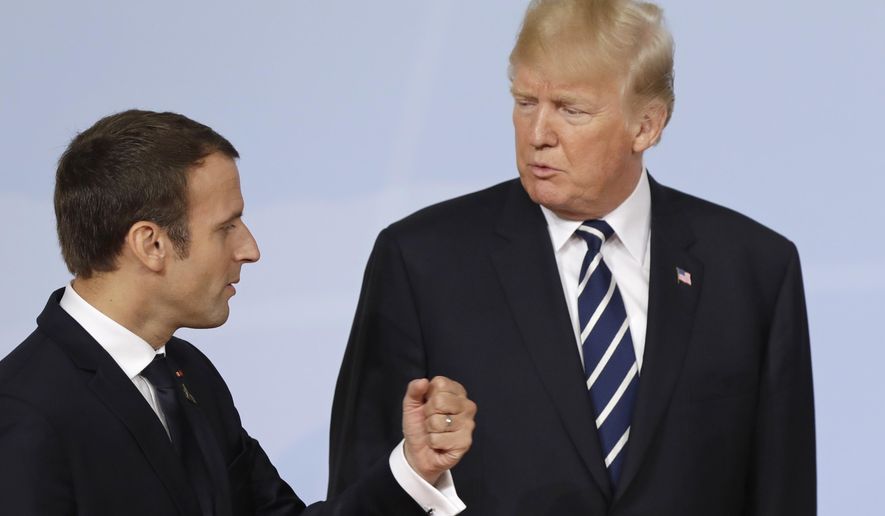WASHINGTON (AP) - President Donald Trump and France’s Emmanuel Macron may be the world’s oddest of political odd couples. Far apart on climate change and immigration, the two leaders will look for common ground on terrorism and defense policy when they meet this week in Paris.
The president will be the guest of honor at this year’s Bastille Day events - a celebration of French national pride at a time when, according to Macron, “our world has never been so divided.”
The overseas trip comes as Trump is dogged by fresh controversy over his campaign’s potential connections to Russia. Donald Trump Jr. on Tuesday disclosed 2016 emails about his meeting with a Russian lawyer described to him as someone who was “part of Russia and its government’s support for Mr. Trump” in the campaign against Hillary Clinton. The president has maintained that neither he nor members of his campaign colluded with the Russian government ahead of the 2016 election.
Macron, for his part, has come out strongly against Russia’s purported efforts to interfere in elections in the U.S. and across Europe. He has accused Moscow of working against his own campaign in support of his opponent, far-right leader Marine Le Pen.
The visit will gauge whether Trump and France’s new leader can find consensus on any of the critical issues on which they find themselves deeply at odds. After Trump withdrew the U.S. from the Paris climate accord agreement last month, Macron, a staunch advocate of research to combat global warming, beckoned “all responsible citizens,” including American scientists and researchers, to bring their fight against climate change to France.
The president will mark the 100th anniversary of America’s entry into World War I by visiting U.S. troops. White House officials are casting it as a celebration of the U.S.-French military alliance - both then and now.
Trump and Macron are scheduled to hold a joint news conference, during which Trump may face tough questions on the latest revelations about his son’s contacts with a Russian lawyer. The two leaders and their wives will end a busy day of meetings Thursday with a lavish dinner at Jules Verne, at the top of the Eiffel Tower.
In the leadup to what will be Trump’s first official visit to France, the White House chose to highlight areas where the two leaders can collaborate, and said their differences could foster more constructive dialogue.
“Macron and the president have somewhat different views on how to achieve the end goal, but I think the end goal is the same,” Trump’s top economic adviser Gary Cohn said last week.
Macron’s path to the presidency was nearly as unlikely as Trump’s. Rejecting ties with the French mainstream parties that had controlled the government since modern France began, he launched his own political movement just over a year ago and campaigned on pro-business and pro-European policies in direct counter to Le Pen.
“Both of these men were elected as outsiders and neither of them is really tied to their own national political establishments,” said Benjamin Haddad, a Washington-based French political analyst with the Hudson Institute. “That may actually work to their advantage.”
And Macron’s national security pitch hasn’t differed drastically from Trump’s. On Syria, he argues for intervention, saying that Syrian President Bashar Assad is a threat to Syria and the Islamic State group is a threat to France. France has been plagued in recent years by a series of extremist attacks, including one of the deadliest attacks during Bastille Day celebrations last year, when a 19-ton cargo truck deliberately plowed into crowds in Nice, killing more than 80 people.
Macron supports intervention against Syria’s government in response to its use of chemical weapons and could prove an important ally as the Trump administration seeks to increase pressure against Damascus. But in doing so, they’ll need to tackle the issue of Russia’s support for Assad, something Trump has only passively acknowledged.
At age 39, Macron became France’s youngest president when he won a runoff against Le Pen in April. Despite no political experience, he pulled together an overwhelming legislative majority in France’s parliament and recent polls show him with strong public popularity.
For Trump, whose approval ratings at home and abroad have sunk since he took office, experts say leveraging Macron’s popularity could be the president’s best bet to thaw his administration’s image among European allies.
“Macron doesn’t have the same constraints as (Germany’s) Angela Merkel, who is entering an election campaign in which her opponents would love to make it a campaign about Donald Trump,” said Jeffrey Rathke, deputy director of the Europe Program at the Center for Strategic and International Studies.
___
Associated Press writer Lori Hinnant contributed to this story from Paris.




Please read our comment policy before commenting.